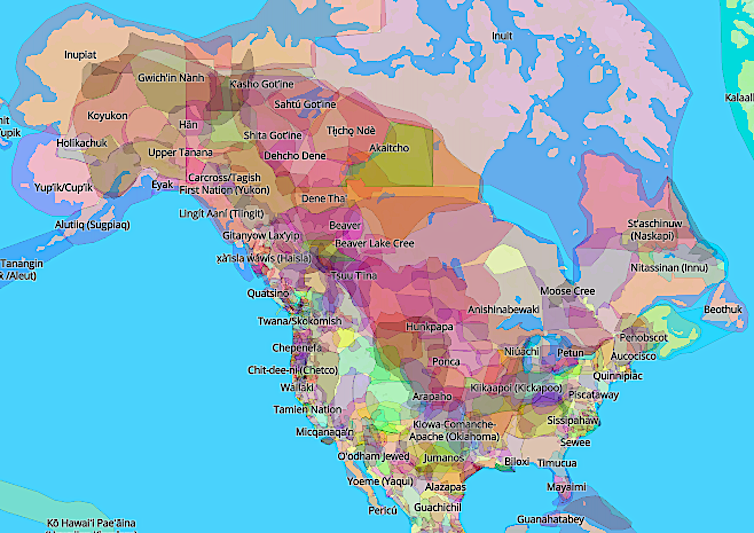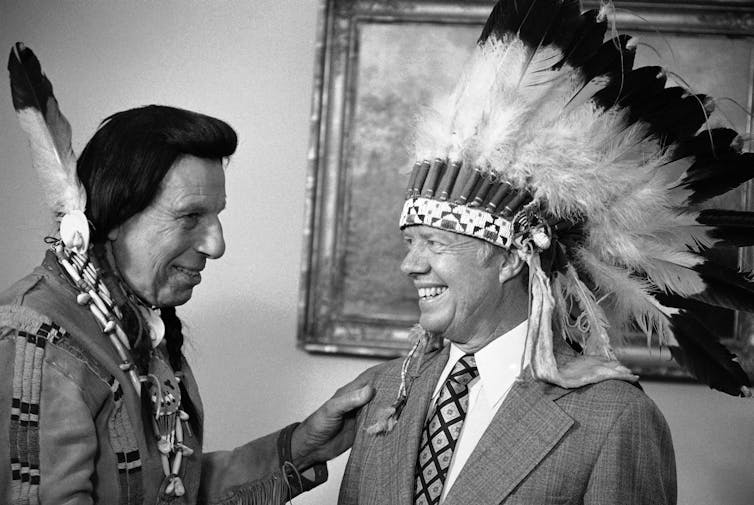Three anthropologists explain why land acknowledgments and the related welcoming ritual can help erase history.

A portion of a map that erases the borders colonial powers drew, and shows instead the Indigenous territories, treaties and languages of North America. (Native Land Digital, CC BY-SA)


 Many events these days begin with land acknowledgments: earnest statements acknowledging that activities are taking place, or institutions, businesses and even homes are built, on land previously owned by Indigenous peoples.
Many events these days begin with land acknowledgments: earnest statements acknowledging that activities are taking place, or institutions, businesses and even homes are built, on land previously owned by Indigenous peoples.
And many organizations now call on employees to incorporate such statements not only at events but in email signatures, videos, syllabuses and so on. Organizations provide resources to facilitate these efforts, including pronunciation guides and video examples.
 Some land acknowledgments are carefully constructed in partnership with the dispossessed. The Burke Museum at the University of Washington in Seattle describes this process:
Some land acknowledgments are carefully constructed in partnership with the dispossessed. The Burke Museum at the University of Washington in Seattle describes this process:
“Tribal elders and leaders are the experts and knowledge-bearers who generously shared their perspectives and guidance with the Burke. Through this consultation, we co-created the Burke’s land acknowledgement.”
That acknowledgment reads:
“We stand on the lands of the Coast Salish peoples, whose ancestors have resided here since Time Immemorial. Many Indigenous peoples thrive in this place—alive and strong.”
Land acknowledgments have been used to start conversations regarding how non-Indigenous people can support Indigenous sovereignty and advocate for land repatriation.
Yet the historical and anthropological facts demonstrate that many contemporary land acknowledgments unintentionally communicate false ideas about the history of dispossession and the current realities of American Indians and Alaska Natives. And those ideas can have detrimental consequences for Indigenous peoples and nations.
This is why, in a move that surprised many non-Indigenous anthropologists to whom land acknowledgments seemed a public good, the Association of Indigenous Anthropologists requested that the American Anthropological Association officially pause land acknowledgments and the related practice of the welcoming ritual, in which Indigenous persons open conferences with prayers or blessings. The pause will enable a task force to recommend improvements after examining these practices and the history of the field’s relationship with American Indians and Alaska Natives more broadly.
Please Support CN’s Fall Fund Drive!
We are three anthropologists directly involved in the request — Valerie Lambert of the Choctaw Nation and president of the Association of Indigenous Anthropologists; Michael Lambert of the Eastern Band of Cherokee Indians and member of the Association of Indigenous Anthropologists; and EJ Sobo, an American Anthropological Association board member charged with representing interests such as those of the Association of Indigenous Anthropologists. We’d like to further illuminate this Indigenous position, not from the association’s perspective but from our perspective as scholars.
‘What Was Once Yours Is Now Ours’
No data exists to demonstrate that land acknowledgments lead to measurable, concrete change. Instead, they often serve as little more than feel-good public gestures signaling ideological conformity to what historians Amna Khalid and Jeffrey Aaron Snyder have called – in the context of higher education’s diversity, equity and inclusion efforts – “a naïve, left-wing, paint-by-numbers approach” to social justice.
Take, for instance, the evocation in many acknowledgments of a time when Indigenous peoples acted as “stewards” or “custodians” of the land now occupied. This and related references — for example, to “ancestral homelands” — relegate Indigenous peoples to a mythic past and fails to acknowledge that they owned the land. Even if unintentionally, such assertions tacitly affirm the putative right of non-Indigenous people to now claim title.
This is also implied in what goes unsaid: After acknowledging that an institution sits on another’s land, there is no follow-up. Plans are almost never articulated to give the land back. The implication is: “What was once yours is now ours.”
Additionally, in most cases these statements fail to acknowledge the violent trauma of land being stolen from Indigenous people — the death, dispossession and displacement of countless individuals and much collective suffering. The afterlives of these traumas are deeply felt and experienced in Indigenous communities.
But because non-Indigenous people are generally unaware of this trauma, land acknowledgments are often heard by Indigenous peoples as the denial of that trauma. This perspective is reinforced by a tendency to cast Indigenous peoples as part of prehistory, suggesting that the trauma of dispossession, if it happened at all, did not happen to real or wholly human people.
Further, land acknowledgments can undermine Indigenous sovereignty in ways that are both insidious and often incomprehensible to non-Indigenous people.
For example, non-Indigenous people tend to seek local “Indigenous” affirmation of their acknowledgment performance, such as by arranging for a conference blessing or Welcome to Country ritual. Such rites often feature the voices of people who, in Indigenous Studies scholar Kim TallBear’s words, play at being Indian – that is, those who have no legitimate claim to an Indigenous identity or sovereign nation status but represent themselves as such.

Actor Iron Eyes Cody, left, with President Jimmy Carter in 1978, built a decades-long career on pretending to be Cherokee. He was of Italian descent. (AP, Peter Bregg)
Appropriation of American Indian and Alaska Native identity by individuals who are not members of sovereign tribes, referred to as “pretendians” by actual American Indians and Alaska Natives, is endemic. Actor Iron Eyes Cody, for instance, built a decades-long career on it despite his Italian heritage.
Demographic data suggests that pretendians outnumber real American Indian and Alaska Natives by a ratio of at least 4-to-1. In some cases, pretendians persist in their claims in the face of clear documentation to the contrary.
When non-Indigenous people allow pretendians authority regarding land acknowledgments and blessing ceremonies, it irreparably harms sovereign Indigenous nations and their citizens. The most threatening message communicated by these acts is that American Indian identity is a racial or ethnic identity that anyone can claim through self-identification. This is not true.
American Indian identity is a political identity based on citizenship in an Indigenous nation whose sovereignty has been acknowledged by the U.S. government. Sovereign Indigenous nations, and only these nations have the authority to determine who is and is not a citizen, and hence who is and is not an American Indian or Alaska Native.
Anything less would undermine the entire body of Indian Law, undoing tribal sovereignty. As Rebecca Nagle of the Cherokee Nation explains in “This Land,” American Indians and Alaska Natives would effectively cease to exist.
And so, particularly when they perpetuate misunderstandings of Indigenous identities, land acknowledgments done wrong are heard by Indigenous peoples as the final blow: a definitive apocalyptic vision of a world in which Indigenous sovereignty and land rights will not be recognized and will be claimed never to have really existed.
Respect & Restoration
Land acknowledgments are not harmful, we believe, if they are done in a way that is respectful of the Indigenous nations who claim the land, accurately tell the story of how the land passed from Indigenous to non-Indigenous control and chart a path forward for redressing the harm inflicted through the process of land dispossession.
What many Indigenous persons want from a land acknowledgment is, first, a clear statement that the land needs to be restored to the Indigenous nation or nations that previously had sovereignty over the land.
This is not unrealistic: There are many creative ways to take restorative measures and even to give land back, such as by returning U.S. national parks to the appropriate tribes. Following from this, land acknowledgments must reveal a sincere commitment to respecting and enhancing Indigenous sovereignty.
If an acknowledgment is discomforting and triggers uncomfortable conversations versus self-congratulation, it is likely on the right track.![]()
Elisa J. Sobo is professor and chair of anthropology at San Diego State University. Michael Lambert is associate professor of African studies and anthropology at the University of North Carolina at Chapel Hill. Valerie Lambert is president of the Association of Indigenous Anthropologists and associate professor of anthropology at the University of North Carolina at Chapel Hill.
This article is republished from The Conversation under a Creative Commons license. Read the original article.
The views expressed are solely those of the authors and may or may not reflect those of Consortium News.
Please Support Our
Fall Fund Drive!


This comment is directed to the authors listed above as something that might b e of interest to them.
FYI – “The Theft of Ohio – 1783 – 1795 by Gale Richard Walker – Turas publishing
“11th. – This was the last act of the farce. The Articles were signed.”
– U.S. Ensign Ebenezer Denny at Marietta at the signing of the two Treaties of Fort Harmer
January 11, 1789
Dr. Walker wrote this book out of passion and understanding. He not only exposes in great detail the blood lust greed of the White man but the naivete of these Indigenous ones with respect to dealing with the cruel, greedy European’s and the Spanish and the imperialist mind.
He include damning evidence of one George Washington among many others. He successfully tells the unwritten sad history of events of the time. Including educating the reader of earliest history of the U.S. congress, the official government body that wasn’t!
This comment is mainly for the benefit of the authors here whom I feel might enjoy , respect and embrace the hard work Dr. Walker invested in this ten year effort to expose some of Americas worst history resulting from the genocide these events unleashed on native Americans.
What started here laid the Indian nations open to conquest for much of the history here provides evidence of where the wealth of the American government came from.
Sad, sad stuff! The story is here to be read and Dr. Walker could not give one shit about the financial success of the book. Being a student of critical thought he is outspoken in his beliefs but a very humble person. Having grown up poor in rural Appalachia Rich knows a thing or two about suffering himself.
Our forefathers jerked the Indians around before trying to kill them all in doing so they learned those lessons well and have been jerking the rest of us around ever since. At this particular time in history I’m not so sure we pale faces won’t be the next group slated for removal.
Thanks CN
Very good, thought-provoking article.
Land acknowledgements are certainly well-meaning, but as the authors argue, meaningless. Interesting that such acknowledgements only occur so many generations after the theft of the land that there is no meaningful chance of restitution. If the land theft had occurred more recent memory, what chance would there be of any acknowledgement? How many Israelis occupying what was (in the memory of some still living people) Palestinian land, or Germans, Austrians, etc. occupying property that had been owned by Jewish persons, or Poles occupying what had been German property (in Silesia, Pomerania, Prussia), or Ukrainians and others occupying what had been Polish property (in former Eastern Poland) are making “acknowledgements”? None. If you bring up the issue, you’ll be attacked and won’t last long in polite society. In one, two hundred years, this will be different – but then it will be only “historical”.
To the extent that it’s not too late, strong efforts should be made to preserve Indigenous language and culture.
The last time I was in Mexico was around two decades ago – then (perhaps still now) a lot of the people there still spoke Indigenous languages – especially the Mayans in the Yucatan peninsula, as well as Nahuatl (Aztecs) in the area around Mexico City – but – if I’m not mistaken – these languages were only oral and not written, considered “peasant languages”, and subject to a strong “educational” program aimed to eradicate them in favor of Spanish, the language of the “white” conquerors. (Similar, it should be noted, to what the French have been doing for hundreds of years to minority languages going back to ancient and medieval times, like Basque and Breton). One grotesque result of this policy is that brown-skinned immigrants from Mexico and Central American are called in the USA “Hispanics”, which is like calling the Indigenous people in the USA “Anglos”.
The attempt to tamper with humanity’s history, has been an ongoing artifice of greed. This deceit makes us all Aliens unto each other, even as we are all Indigenous humanity, somewhere on this one finite, unique, planet.
America, for one, conveniently, since time immemorial, from its institutional inception; from its nationalist promontory “on a hill” has starkly taught, by example, that ‘civilization’ is built on ‘criminality’.
Apparently, civilization and conscience are not yet mutually inclusive terms, in the human race’s empathic repertoire.
Those, being without a more enlightened conscious, are definitely less capable of being more fully aware of their lack of conscience.
Some of these folks, in this day and age, may be defined as sociopaths.
Julian Assange is NOT one of them, yet he is being illegitimately held as a criminal, by a so-called righteous civilization, in whose behalf his life is being forfeited. However, the vast majority in this world of opulence are, as yet, still incapable of seeing the forest for the trees.
Nowadays, the basic confusion lies in the misunderstanding of who actually controls the power of applying definitions to words.
In the twenty-first century, is there even any agreement as to what the word ‘ownership’ means, in relation to what it meant for time immemorial, to the Indigenous peoples of the Americas.
At this pivot point in the historical evolution of ‘progress’; a how come? is all that this pen can muster!
Very good.
And from the Moody Blues’ “Question”:
“Why do we never get an answer
when we’re knocking on the door
With a a thousand million questions
about hate and death and war?
In a world of persecution
that is burning in its greed
If we stop and look around us
there is nothing that we need
…”
As always, the response to an article like this is “What then?” Well? What is to be done? It seems like historic American Indian nations can lay claim to just about every existing tract of land on the continent, so what would you have done after recognizing property rights of each one? Where would that acknowledgement then lead? Would you strip the property rights of every living inhabitant who fails some racial purity test and place them in the hands of an ethnonationalist consortium? Would you expel the foreign occupiers who have now lived there for generations through no malicious intent of their own? Hundreds of millions deported back to whatever corners of the world their ancestors migrated from (you might be in trouble if you have mixed ancestry) in the name of restoring the state of American Indian societies before European contact? Maybe it’s time to acknowledge that there is not and can never truly be real justice for crimes perpetuated against dead people by other dead people. That there’s no way to undo the past that doesn’t predicate on unjust retribution towards the innocent who merely had the misfortune of having a criminal as an ancestor. And that we should spend our time trying to make the lives of -everyone- better in the present.
If some people are wealthy today because of inheritance from a “criminal as an ancestor” reparations to those who are destitute today because of that may be in order. This extends to ancestors of slave owners.
Exactly. Martin Luther King, Jr understood that a better future for Black folks lay in universal progress, not in separating Black people from everyone else – which was and is exactly how racists like it.